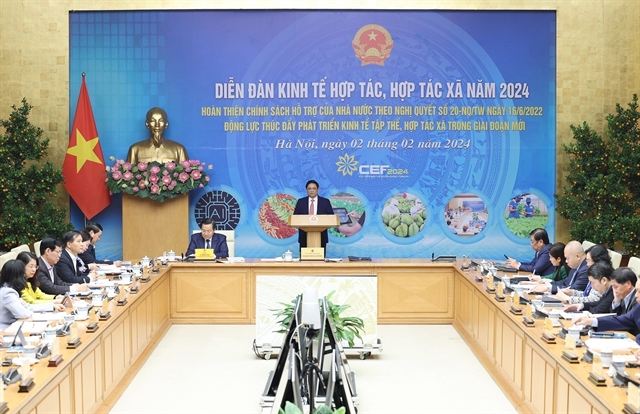
|
| PM Phạm Minh Chính spoke at a forum on economic cooperation and cooperatives held in Hà Nội on Friday. —VNA/VNS Photo Dương Giang |
HÀ NỘI — Prime Minister Phạm Minh Chính has asked ministries and sectors to develop supportive policies for cooperatives toward comprehensive innovation, including specific mechanisms on mobilising and using capital.
These policies will create opportunities and motivation for the collective economic sector and cooperatives to have sustainable and comprehensive development, Chính said.
The PM made this request at a forum on economic cooperation and cooperatives held in Hà Nội on Friday.
This year’s annual forum of the Government, connected with all 63 provinces and cities via teleconference, focused on the perfection of the State’s support policies for the collective economy and cooperatives in line with the Party Central Committee’s Resolution 20-/NQ/TW, dated June 16, 2022.
PM Chính noted that the collective economy is one of the four important economic components of the socialist-oriented market economy of Việt Nam. Over the past years, the Party, State, Government, all-level authorities, sectors and localities have carried out many mechanisms and policies to facilitate the collective economy and cooperatives.
At present, he said, the collective economy has basically addressed prolonged weaknesses, completing the transformation to a new-style model. Cooperatives and unions of cooperatives have increased considerably and become more diverse in terms of industries, scales and levels.
They have better assisted their members, created more jobs and further improved workers’ income. The connectivity among cooperatives and their connectivity with businesses and other economic components have begun developing.
Last year, there were more than 31,700 cooperatives, 158 cooperatives’ unions, and 73,000 cooperative groups nationwide. Each cooperative earned nearly VNĐ3.6 billion (US$147,900) in revenue and VNĐ366 million in profit on average in 2022, rising respectively 35 per cent and 71 per cent year on year. Per capita income of workers in cooperatives averaged VNĐ56 million in 2022, according to the Ministry of Planning and Investment.
The collective economy and cooperatives have contributed to economic growth directly and indirectly, through impacts on their members, PM Chính said, citing data of the General Statistics Office showing that they have contributed nearly 4 per cent of the country’s GDP. In many localities like Thái Nguyên, Lâm Đồng, Đắk Lắk, Đồng Tháp, An Giang and Cà Mau, cooperatives have played a crucial role in the formation of large-scale cash crop production zones to serve processing and export.
However, the Government leader also pointed out that their development has yet to catch up with their potential, meet requirements, or match the attention, policies and expectations of the Party and State.
For the time ahead, the collective economy and cooperatives need to work proactively to escape from persistent weaknesses and obstacles to move forward; strongly change both mindset and action to apply scientific and technological advances, conduct green transition and boost digital transformation; develop the quantity and quality of members and the workforce; and improve the capital use efficiency, labour productivity, and connectivity under supply chains, he demanded.
He said the resolution targets having 45,000 cooperatives with 8 million members, 340 cooperatives’ unions with 1,700 member cooperatives by 2030, with over 60 per cent of entities of the collective economy operating effectively, including at least 50 per cent involved in value chains. It also aims at having over 90 per cent of those entities operating effectively, including at least 75 per cent involved in value chains, by 2045.
Requesting both quantitative and qualitative development of the collective economy, PM Chính said it is necessary to issue priority policies for entities working in agriculture, link their production and business activities with value chains, help them apply science and technology, boost innovation and digital transformation, and connect their development with that of the green economy, circular economy and knowledge-based economy.
As Việt Nam is building an independent and self-reliant economy that extensively, practically and effectively integrates into the world, the collective economy and cooperatives must also stay self-reliant and resilient, enhancing connectivity among members as well as between the collective economy and other economic sectors, and expand cooperation with international partners, he said.
The PM affirmed that the Government always encourages and provides the best possible conditions in line with laws for the collective economy and cooperatives to develop quickly, sustainably, inclusively and comprehensively to contribute to national socio-economic development. — VNS
- Reduce Hair Loss with PURA D’OR Gold Label Shampoo
- Castor Oil Has Made a “Huge” Difference With Hair and Brow Growth
- Excessive hair loss in men: Signs of illness that cannot be subjective
- Dịch Vụ SEO Website ở Los Angeles, CA: đưa trang web doanh nghiệp bạn lên top Google
- Nails Salon Sierra Madre
 VnExpress News The News Gateway of Vietnam
VnExpress News The News Gateway of Vietnam




